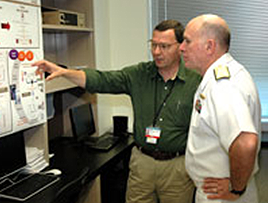Navy surgeon general says campus doing ‘amazing things’
U.S. Navy Surgeon General Matthew Nathan, right, hears about bladder cancer research from Dan Theodorescu, M.D., director of the CU Cancer Center, during a tour of the Anschutz Medical Campus.
The clinical, educational and research work being conducted at the Anschutz Medical Campus is "clearly putting this area on the map," Vice Admiral Matthew Nathan, surgeon general of the U.S. Navy, said during a campus tour April 30.
Nathan visited as part of the Navy's 50-50 program, which is sending 50 of the Navy's top leaders to 50 of the nation's epicenters for growth, education and commerce. "Clearly, this area here in greater Denver is a shaker and mover for the country," he said.
Jeff Thompson, director of government and corporate relations for University of Colorado Health, led Nathan on a tour of the Rocky Mountain Lions Eye Institute, the CU Cancer Center, the Inpatient Tower of the University of Colorado Hospital and the bladder cancer research lab of Dan Theodorescu, M.D., Ph.D., director of the Cancer Center. After lunch in the 500 Building, Nathan toured the Eisenhower Suite.
Anschutz Medical Campus is becoming a regular stop for our nation's high-ranking military medical officials, including the surgeons general from the Army and Air Force. U.S. Surgeon General Regina Benjamin visited on April 4 to celebrate the opening of the Colorado Center for Health and Wellness Center and National Health Week.
Thompson said the campus is "definitely a draw" with its renowned clinical care, research and educational components, as well as its emphasis on community outreach. "Really, we have it all here and, when we have a visiting leader like the admiral, we definitely want them to get the full picture of what we're all about," he said.
After visiting Theodorescu's lab in Research 2, Nathan said, "I'm quite sure there's no better place in the country to get care for bladder cancer."
During lunch, Nathan was introduced by Neil Krauss, MSF, MA, director of administration, Anschutz Medical Campus. He heard about more research from Mark Petrash, Ph.D., professor and vice chair of research for the School of Medicine's Ophthalmology Department; Theresa Pacheco, M.D., assistant professor, Dermatology Department; and David Poticha, MS, JD, senior licensing manager of the CU Technology Transfer Office.
Nathan told the lunch gathering that U.S. Navy Medicine is a $6 billion health care network with 63,000 people worldwide.
He said he tries to push the Office of Naval Research, which has awarded grants to the Anschutz Medical Campus, to "be as generous with the money as they can" to not only military institutions but partner academic institutions. "It makes it harder to stop or create cessation to some of the programs," Nathan said. "I just believe united we stand, divided we fall."
He said the expectation of the American citizenry is to have modern medical care available anywhere in the world. That's what U.S. Navy Medicine, which also provides health care to the U.S. Marine Corps, is striving to do.
"We're always interested in learning new things that are happening in partnering institutions. I've really enjoyed the opportunity to see some of the amazing things you're doing here and to talk to some of your passionate researchers," Nathan said. "I think, clearly, you're putting this area on the map with the kind of medical prowess and reputation that you're starting to create for yourself. If that flywheel keeps turning fast enough, it will be impressive."


